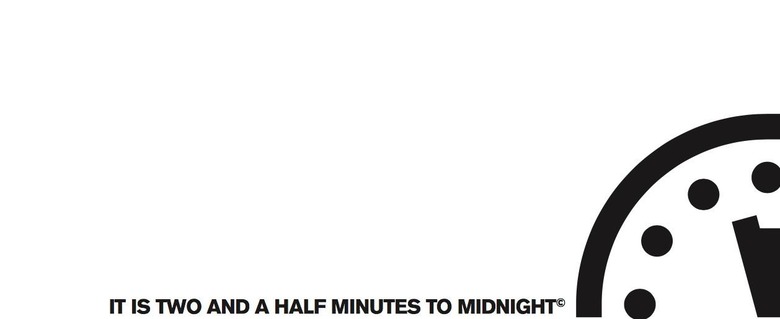Doomsday Is 150 Seconds Away: Trump, Nukes And Hacks To Blame
The Doomsday Clock has moved 30 seconds closer to midnight and global destruction, with President Trump's apparently cavalier attitude to nuclear weapons and climate change spooking scientists. Founded in 1947, by the board of directors of the Bulletin of the Atomic Scientists at the University of Chicago, the clock was originally intended solely as a symbol of the threat of nuclear war. In the seventy years since then, its role has expanded to encompass the collective threats of climate change and more.
Originally, the clock was set at 11:53pm, or seven minutes to midnight. The closest it has ever got to midnight was in 1953, when the group set it to 11.58pm after the US and Russia each tested thermonuclear devices within the space of nine months. Back in 2012, the Bulletin of the Atomic Scientists cited insufficient work on nuclear proliferation and a blasé attitude toward climate change for changing the time; in 2015, we were only three minutes from doomsday.
Now, we're within thirty seconds of that 1953 nuclear crisis. For the first time in the seven decades the clock has been "operating", a half-minute change has been approved by the Atomic Scientists. Although the reasons for that aren't entirely down to newly-elected and still-controversial President Trump, he and his policies certainly aren't helping.
That Trump made "disturbing comments about the use and proliferation of nuclear weapons and expressed disbelief in the overwhelming scientific consensus on climate change" during his campaign is cited, as are his more recent proclamations as President. "Both his statements and his actions as president-elect have broken with historical precedent in unsettling ways," the group writes. "He has made ill-considered comments about expanding the US nuclear arsenal. He has shown a troubling propensity to discount or outright reject expert advice related to international security, including the conclusions of intelligence experts. And his nominees to head the Energy Department and the Environmental Protection Agency dispute the basics of climate science."

Meanwhile the part played by Russian intelligence in reportedly manipulating the US election process is also highlighted, as is "wavering public confidence" worldwide in the democratic process. North Korea's continued development of nuclear weapons hasn't helped, in addition to ongoing missile tests carried out at a rate of two per month. Russia, too, is working on new nukes, as China, Pakistan, and India all increase their offensive capabilities.
On the climate change side, though levels of gas emissions have apparently been steady in the past year, there's still insufficient movement toward bringing them down to zero. "Nothing is fundamentally amiss with the scientific understanding of climate physics," the Atomic Scientists point out, but politics haven't caught up with that knowledge. Of specific risk are some of Trump's cabinet appointees, who are seemingly "openly hostile to progress toward even the most modest efforts to avert catastrophic climate disruption."
Coupled with the rise of "fake news" and declining trust in the media from some quarters, the potential of genetic weapons being developed, insufficient safety around autonomous vehicles, online data insecurity, and uncertain safety of new nuclear power facilities, it's not looking so great for Mother Earth. The Atomic Scientists suggest citizen uproar might help, demanding nuclear temperance and an acknowledgment of climate change. "It is two and a half minutes to midnight, the Clock is ticking, global danger looms," they conclude. "Wise public officials should act immediately, guiding humanity away from the brink. If they do not, wise citizens must step forward and lead the way."
